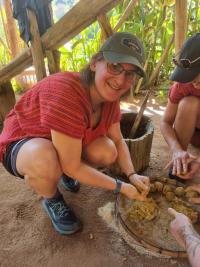Faculty Research Highlights
Faculty in our department are leading research projects on a wide range of different topics. Here are some of the news stories about their research on the human condition.

Many researchers contend that human alteration of the earth is so widespread that we have entered a new period in geologic time: the Anthropocene, an age defined by the human presence on the planet. Dr. Nick Kawa’s research directly engages this proposed geological epoch by investigating how humans have altered environments once deemed to be pristine, including the Amazonian rainforest. His work also examines what it means for humanity to define a new geological age and what assumptions are embedded in such a claim. To learn more, you can listen to his NPR Morning Edition appearance titled Drawing A Line In The Mud: Scientists Debate When 'Age Of Humans' Began and the one titled Scientists are a step closer to defining when the age of humans officially began

Julie Field, an associate professor in anthropology, co-authored a study of fire frequency on Pacific Islands. With her colleague Chris Roos of Southern Methodist University and John Dudgeon of Idaho State University, the team analyzed sediment cores from the Fiji Islands to determine how fire activity and landscape transformation accelerated with the establishment and expansion of swidden agriculture. Their research was published in 2023 in the journal Nature Ecology and Evolution.

Richard Yerkes, Professor of Anthropology has been involved in ongoing research in Hungary supported by the National Science Foundations and other sources on the origin of prehistoric European farming villages. Former OSU Ph.D. student, Julia Giblin, now Professor and Anthropology Program Director at Quinnipiac University, Hungarian colleague, Attila Gyucha (tenure-track Assistant Professor at the University of Georgia, Athens), and William Parkinson (Field Museum, Chicago) have been examining development social stratification and warfare in two Neolithic Tells, and two fortified Copper Villages on the Great Hungarian Plain and have published the book Bikeri: Two Copper Age Villages.
Yerkes also collaborated with Jay Toth of Seneca Nation, and Ariane Pépin in a study of Indigenous Native American Perspectives on Functions of ancient Hopewell Bifaces. Yerkes has also been examining how the adoption of farming changed patterns of American Indian warfare in prehistoric times. In other research, with Professors Ran Barkai and Avi Gopher and their graduate students at Tel Aviv University, he wrote or co-wrote eight invited chapters for the edited book Ein Zippori Volume II: The Lithic Assemblages of the Pre-Pottery Neolithic, Pottery Neolithic, and Early Bronze Age Layers.
Yerkes also has continued his international collaboration with Professor Michael L. Galaty (Director, Museum of Anthropology, University of Michigan) and Professsor Lorenc Bejko (Archaeology Department, University of Tirana, Albania). His chapter on Faunal Analysis of material from PASH investigations was published in Archaeological Investigations in a Northern Albanian Province: Results of the Projekti Arkeologjik i Shkodrës (PASH), Volume 2: Artifacts and Artifact Analysis by the UM press.
For decades the question of agricultural origins channeled researchers to search out the earliest villagers and transition societies. My archaeological and archaeobotanical research instead probes the processes and developments by which early food producers sustained their societies, spread into new environments, and developed new technologies and practices. From the development and integration of specialized herding and farming communities in Mesopotamia to the pilgrimage rituals of Arabian pastoralists, McCorriston traces the transformation of Middle Eastern landscapes and resilience of social communities from the Neolithic through historic times. McCorriston directs the OSU Near Eastern Archaeobotanical Laboratory.

